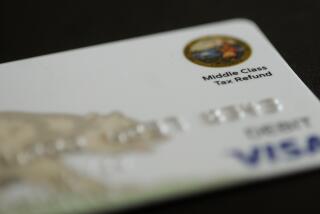Field of Schemes: Iowa Rebate Scam Makes Unlikely Con Artists : Fraud: Grandma clips coupons, Sis pools receipts and the church gets a check. It sounds innocent enough, but it is illegal.
- Share via
ROCK VALLEY, Iowa — This is a farm community of tidy homes and clean streets, a place where prayer is a constant--a bottle-shaped billboard east of town proclaims, “Get high on Jesus”--and liquor is frowned upon.
This, investigators say, was a hotbed of fraud, a highly organized racket that bilked some of America’s best-known manufacturers out of more than $500,000 over the last two decades.
This is all very confusing to the people of Rock Valley, population 2,540.
“We’re just getting hammered from one side and another,” complained a clerk at the M&H; True Value Farm and Home Store, before he was admonished by a fellow worker to “keep your mouth shut.”
What his neighbors did was very simple. For years, they pooled their rebate coupons, proofs-of-purchase and cash-register receipts, sorted them out and then submitted them for cash to benefit the Rock Valley Christian School and the Netherlands Reformed Christian School, among others.
The “Cash for Trash” program was enormously successful, raising at least $200 for every man, woman and child in this northwest Iowa town.
One problem. It was illegal.
“It’s a little here and a little there and for manufacturers it’s a death of a thousand cuts,” said David Vienna, a manufacturers’ fraud tracker and former Senate investigator.
“Are these high crimes and misdemeanors? Use of the mail to deceive, no matter how much the amount, is a felony,” Vienna said.
It all looked harmless enough. Families would bring in detergent boxes, aerosol cans, cheese wrappers and cereal boxes and pool cash register receipts. At sessions resembling quilting bees, volunteers sorted out box tops and UPC, or universal product code, symbols that manufacturers required. Those are saved for use with rebate offers and matched with cash-register tapes.
Participants agreed to let the group use their names and addresses to submit the rebate claims. When checks arrived, the recipient was expected, but not required, to turn them over.
They ignored the fine print, which prohibits the transfer of the rebate rights. Sharing is a way of life in this part of Iowa; farmers provide livestock for free butchering to feed the needy and supermarkets encourage parents to pool cash register receipts to exchange for classroom computers.
Cash for Trash programs also filled a social need.
“This was done by a group of people who sat around and visited and had coffee together. It was an enjoyable social activity that many of the retired people were involved with. It gave these older people a way of feeling they were still helping with the education of their grandkids,” said Glen Streimsma, principal of the Rock Valley Christian School.
The checks rolled in--a few cents here, a $15 windfall there. And it would have gone on forever but for the rising frustration of the rebaters.
“It is a criminal activity,” insisted Bud Miller, a colleague of Vienna’s at the Rebate Information Center in Alexandria, Va.
The industry-sponsored center estimates the cost of rebate fraud to manufacturers at $325 million, over and above the $500 million annual tab for coupon fraud. The result, the organization says, is higher prices.
Industry first focused on Iowa because of a high response rate to rebate offers. A low-profile 1991 operation dubbed “The Hawkeye Project,” reflecting the Hawkeye State nickname of Iowa, was set up by General Foods, Gillette, Kodak, Procter & Gamble and Ralston-Purina to work with the Postal Service.
Iowa is not alone in having suspiciously high rebate rates; Vienna says rural areas around Pittsburgh, communities along the Ohio-Indiana border and parts of Upstate New York, Minnesota, Nebraska, South Dakota and Washington state also have high concentrations.
But Rock Valley is “probably the most intense if not the most intense rebating area in the nation,” Vienna said.
While the average response rate to a rebate offer from an Iowa ZIP code was 5% of the households, the Rock Valley ZIP code response was 62%.
Investigators from the Postal Service and Procter & Gamble went to Rock Valley last summer, only to find nearly an entire community engaged in the fraud on behalf of the two fundamentalist schools.
“We are used to dealing with a lot less reputable people doing this,” said Vienna’s colleague, Miller.
“The schools had been doing the rebating for over 10 years, probably portions of it were in a gray area,” said Albert Brady, a postal inspector from Omaha, Neb., assigned to the case. “People saw how to do it and thought, ‘I could do that at home.’ ”
Some did, and one of Brady’s first stops was at the home of Bradley Kleinwolterink, who says he was receiving as much as $80 a day. The rebate payments were addressed to more than two dozen variations of his first and last name. B. Klein was one such combination.
Kleinwolterink said the checks were turned over to his mother-in-law, Alta Groeneweg. He said Groeneweg and her sister, Betty Hoogendoorn, were doing the same thing in more than 30 households of relatives, using variations on the names of 96 children, grandchildren and great-grandchildren.
Brady said the women bought their own cash registers to produce receipts used to “prove” they had bought products qualifying for rebates. What had started as an effort for charity, it appears, had become a business.
“We just never felt right about it,” Kleinwolterink said. But until the investigation he kept at it because “it’s a deal where you don’t want to create hate and discontent with family members.”
There is discontent now.
“She’s crooked, that’s my mother-in-law, man,” he said. “Most people in this town are good people. They’re not crooks.”
No criminal charges were filed. But the women, without admitting that they broke the law, consented to a Dec. 31 cease-and-desist order by the U.S. Postal Service. They promised they would stop manipulating names and addresses and making their own receipts, and they agreed to follow rebate rules.
The women won’t comment. “They splashed our name so bad. We’ll just keep our mouths shut and keep it cool,” said Betty Hoogendoorn.
The heat was on, and the two Rock Valley schools sued for peace. First, they asked the manufacturers to waive their rebate rules.
“While we are sympathetic with the groups, we always decline them. Refund offers are aimed at individuals. They are not transferable,” said Ann Jenemann Smith, a Procter & Gamble spokeswoman in Cincinnati.
Then the schools gave up, canceling their Cash for Trash programs.
“We don’t want to ruin our Lord’s name or our school’s name by what we do,” said Donald R. Klein, a lawyer for the Rock Valley Christian School. “It did not look good for us as Christians to do something offensive to these companies.”
The school was expecting $8,000 from Cash for Trash this year, just over 1% of its $600,000 budget. And tuition increases may have to make up the difference, according to Streimsma, the principal.
In nearby Sheldon, the St. Patrick’s Parish ladies’ guild announced that it too would end its Cash for Trash program--but only after a protracted battle with their priest, Father James McAlpin, who saw “a contradiction in coming to give praise to God and bringing along your garbage.”
The ladies were reluctant to give up an income of as much as $1,250 a week, which helped pay for carpeting and to pave sidewalks around the church. There was even talk of buying a car for the nuns, but the guild bowed reluctantly to the parish board’s wishes and announced that they would shut down by April 1.
No criminal charges have been filed against Iowa’s unlikely con artists: “We’re not in the business of putting Susie Jones of the Rigid Congregation in jail, but what we would like her to do is buy the product,” said Vienna.
Still, folks in Rock Valley and other nearby towns believe they have been unjustly maligned. Outsiders are “just making a big joke of it,” complained the clerk at M&H.; The townspeople, stolid Calvinists, are being portrayed as “some dark band of pirates,” Klein lamented.
And some still don’t acknowledge that what was done was wrong.
“It’s been going on for 20 years,” said Calvin Kemp, principal of the Doon Christian School. “It was fine with the companies for 20 years. It gets to be hurting their pocketbooks, and they’re putting a stop to it.”
More to Read
Sign up for Essential California
The most important California stories and recommendations in your inbox every morning.
You may occasionally receive promotional content from the Los Angeles Times.













